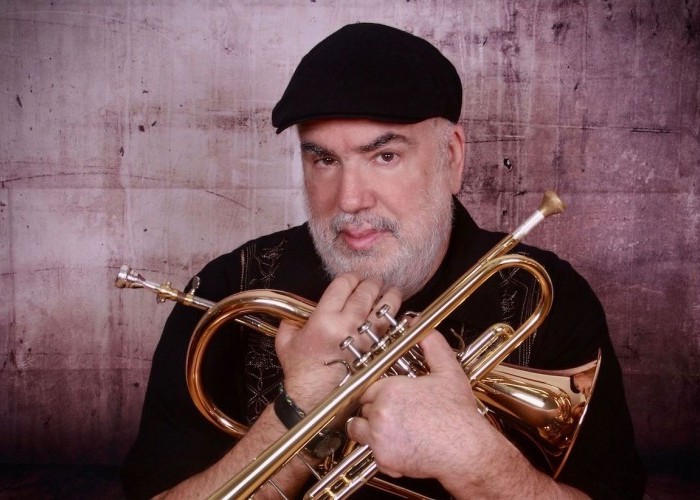Jan 13, 2026 2:09 PM
More Trump-Kennedy Center Cancellations
The fallout from the renaming of the John F. Kennedy Center for the Performing Arts to include President Donald…

For Randy Brecker’s latest outing, he’s supported by Hamburg, Germany’s NDR Bigband.
(Photo: Ada Rovatti)Carving out space on jazz radio can be more than a little challenging. If the music falls into some category other than straightahead or smooth jazz, there’s a chance a recording might fall into some nebulous void.
The most obvious victim is the kind of electrified music variously known as jazz-rock, jazz-funk or fusion that the Brecker Brothers pioneered alongside Weather Report, Return to Forever, the Mahavishnu Orchestra and Miles Davis in the ’70s.
“We’re caught in the middle,” Randy Brecker recently lamented. “On Sirius, there’s an hour with Marcus Miller on the ‘serious jazz’ station. The Ken Burns documentary basically skipped over the whole genre. And there was a lot of good music that people still enjoy playing and hearing.”
Fortunately, public radio in Europe still takes that music seriously, not only in its programming, but also in the repertoire of the government-subsidized big bands that are attached to many of those stations. Brecker has enjoyed a late-career renaissance as the trumpet soloist of choice when those ensembles tackle fusion. His new release, Rocks (Piloo), was recorded with Hamburg, Germany’s NDR Bigband, but during the past nine years, he also has recorded with the Latvian Big Band, the Danish Radio Big Band, Finland’s UMO Jazz Orchestra and Germany’s WDR Big Band.
“I’ve played with just about all of them over the past 20 or 30 years, both on stage and in the studio,” Brecker said. “And the music is always first-rate. The bands are tight as hell, because it’s a full-time job—imagine that, you go into work every day and play. So, these guys have their chops up and you know they’re going to play. Musicians and arrangers would have a better opportunity to ply their wares if we had that system here.”
Brecker got his start performing with the big bands of Clark Terry, Duke Pearson, and Thad Jones and Mel Lewis. As a 21-year-old, he was “starstruck” to be playing alongside such legends, and his reading and improvising skills rapidly improved because of the company he kept.
“Even if you’re not soloing more than once a night,” Brecker said, “just playing with great musicians like those helps you. It’s still a thrill today to stand out front of a big band as the soloist and hear all that sound going on behind you. It brings the best out in me.”
The idea behind Rocks was to feature Brecker’s compositions from all phases of his career, but with an emphasis on those from the Brecker Brothers. Arranger/conductor Jörg Achim Keller wanted to recreate the sound of that octet with its three-horn front line and then flesh it out with 19 more musicians, including classical woodwinds. The resulting music features the hard-hitting horns and funky bottom of the originals, supplemented by expansive harmonies.
“Jörg’s arrangements were very creative,” Brecker said. “He recreated the core of the original tune, but then added on all this other great stuff. He transcribed the solos off the original records and used that as parts in the background. We used my old friend, Wolfgang Haffner, one of the great drummers anywhere, so I knew it was going to swing.”
Two-thirds of the Brecker Brothers’ original three horns, Brecker and alto saxophonist David Sanborn, reunited for the first time in years for the project. Taking the place of the other Brecker brother, tenor saxophonist Michael, who died in 2007, is another family member: Randy’s wife, Ada Rovatti. Later this year, the couple will release an album called Brecker Plays Rovatti, a disc devoted to her compositions.
“David and I always had a similar conception of combining elements of traditional bebop with soul music,” Brecker recalled. “This goes back to when we were 15 at the Stan Kenton Jazz Camp. When David and Michael moved to New York in the early ’70s, I thought that would be a great lineup. It was an exciting time. The way we composed and played was unlike anything that came before or came after. It wasn’t just vamping on one chord; we always created interesting changes to solo over, but we had that r&b feel.” DB

Belá Fleck during an interview with Fredrika Whitfield on CNN.
Jan 13, 2026 2:09 PM
The fallout from the renaming of the John F. Kennedy Center for the Performing Arts to include President Donald…

Peplowski first came to prominence in legacy swing bands, including the final iteration of the Benny Goodman Orchestra, before beginning a solo career in the late 1980s.
Feb 3, 2026 12:10 AM
Ken Peplowski, a clarinetist and tenor saxophonist who straddled the worlds of traditional and modern jazz, died Feb. 2…

The success of Oregon’s first album, 1971’s Music Of Another Present Era, allowed Towner to establish a solo career.
Jan 19, 2026 5:02 PM
Ralph Towner, a guitarist and composer who blended multiple genres, including jazz — and throughout them all remained…

Rico’s Anti-Microbial Instrument Swab
Jan 19, 2026 2:48 PM
With this year’s NAMM Show right around the corner, we can look forward to plenty of new and innovative instruments…

Richie Beirach was particularly renowned for his approach to chromatic harmony, which he used to improvise reharmonizations of originals and standards.
Jan 27, 2026 11:19 AM
Richie Beirach, a pianist and composer who channeled a knowledge of modern classical music into his jazz practice,…